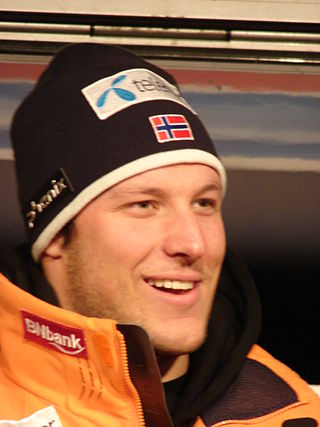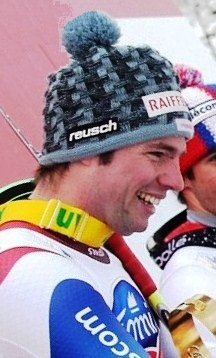Final point standings
In men's downhill World Cup 1969/70 the best 3 results count. Deductions are given in brackets.
Contents
| Alpine skiing World Cup | |
| Men | |
Overall | Downhill | Giant slalom | Slalom | |
| 1970 |
| 1970 Men's Downhill World Cup | |
| Previous: 1969 | Next: 1971 |
Men's downhill World Cup 1969/1970
In men's downhill World Cup 1969/70 the best 3 results count. Deductions are given in brackets.
| Alpine skiing World Cup | |
| Men | |
Overall | Downhill | Giant slalom | Slalom | |
| 1970 |

Downhill is a form of alpine skiing competition. Whereas the other alpine skiing events emphasize turning and technique, downhill emphasizes "the six components of technique, courage, speed, risk, physical condition and judgement", according to the FIS "International Ski Competition Rules (ICR)". Speeds of up to 130 km/h (81 mph) are common in international competition. Athletes must have an aerodynamically efficient tuck position to minimize drag and increase speed.

Super giant slalom, or super-G, is a racing discipline of alpine skiing. Along with the faster downhill, it is regarded as a "speed" event, in contrast to the technical events giant slalom and slalom. It debuted as an official World Cup event during the 1983 season and was added to the official schedule of the World Championships in 1987 and the Winter Olympics in 1988.
Hartmann "Harti" Weirather is a former World Cup alpine ski racer from Austria. Born in Reutte, Tyrol, he specialized in the downhill event.
Combined is an event in alpine ski racing. The event format has changed within the last 30 years. A traditional combined competition is a two-day event consisting of one run of downhill and two runs of slalom; each discipline takes place on a separate day. The winner is the skier with the fastest aggregate time. Until the 1990s, a complicated point system was used to determine placings in the combined event. Since then, a modified version, called either a "super combined" or an "Alpine combined", has been run as an aggregate time event consisting of two runs: first, a one-run speed event and then only one run of slalom, with both portions held on the same day.
The 39th World Cup season began in October 2004 in Sölden, Austria, and concluded in March 2005 at the World Cup finals in Lenzerheide, Switzerland. The overall winners were Bode Miller of the U.S. and Anja Pärson of Sweden.
The 38th World Cup season began in October 2003 in Sölden, Austria, and concluded at the World Cup finals in Sestriere, Italy, in March 2004. Sestriere would host the alpine skiing events at the 2006 Winter Olympics.
The 21st World Cup season began in August 1986 in Argentina for men, resumed in late November, and concluded in March 1987 in Sarajevo. The overall champions were Pirmin Zurbriggen and Maria Walliser, both of Switzerland, who each won for the second time. Two-time women's overall World Cup champion Erika Hess of Switzerland retired at the end of the season.
The 15th World Cup season began in December 1980 in France and concluded in March 1981 in Switzerland. Phil Mahre became the first American to win an overall title, the first of his three consecutive overall titles. Marie-Theres Nadig of Switzerland won the women's overall title.
The 13th World Cup season began in December 1978 in Austria and concluded in March 1979 in Japan.
The 4th World Cup season began in December 1969 in France and concluded in March 1970 in Norway. Karl Schranz of Austria won his second consecutive overall title. Michèle Jacot of France won the women's overall title.
The third World Cup season began in December 1968 and concluded in March 1969. This was the first season in which the races began prior to January 1, and that change immediately became permanent. Karl Schranz of Austria won the first of two consecutive overall titles. Gertrude Gabl of Austria won the women's overall title. For the first and only time in World Cup history, a discipline trophy was shared by more than two people, as four men tied for the Men's Slalom trophy.

Bernhard Russi is a former World Cup alpine ski racer from Switzerland. Born in Andermatt in the canton of Uri, he is an Olympic, World Cup, and World champion in the downhill event.
Men's downhill World Cup 1968/1969

The 43rd World Cup season began in late October 2008 in Sölden, Austria, and concluded in mid-March 2009, at the World Cup finals in Åre, Sweden.

Birds of Prey is a World Cup downhill ski course in the western United States, located at Beaver Creek Resort in Avon, Colorado. The race course made its World Cup debut 26 years ago in December 1997.

The 44th World Cup season began on 24 October 2009, in Sölden, Austria, and concluded on 14 March 2010, at the World Cup finals in Garmisch, Germany.
Karl Cordin is an Austrian former alpine skier who did only compete in Downhill Races; he competed in the 1972 Winter Olympics, becoming 7th silver medal at FIS Alpine World Ski Championships 1970 in downhill.

The 48th World Cup season began on 26 October 2013, in Sölden, Austria, and concluded on 16 March 2014 at the World Cup finals in Lenzerheide, Switzerland. The defending overall champions from the 2013 season were Marcel Hirscher of Austria and Tina Maze of Slovenia. The overall titles were won by Hirscher and Anna Fenninger, also of Austria. The season was interrupted by the 2014 Winter Olympics that took place from 7 to 23 February in Sochi, Russia, with the alpine events at Rosa Khutor.

The 49th World Cup season began on 25 October 2014, in Sölden, Austria, and concluded on 22 March 2015 at the World Cup finals in Meribel, France. The defending overall champions from the 2014 season - Marcel Hirscher and Anna Fenninger, both of Austria, defended their titles successfully. The season was interrupted by the World Championships in February, in the United States at Vail/Beaver Creek, Colorado. Combined events were not awarded as a discipline trophy.

The men's downhill in the 2021 FIS Alpine Skiing World Cup consisted of seven events. The original schedule had contained nine downhills, but a rescheduled one on 5 March in Saalbach-Hinterglemm, Austria, was canceled due to fog and continual snowfall after just nine skiers had finished, and the downhill during World Cup finals week was also canceled.